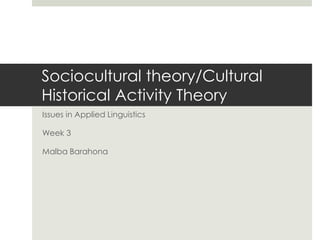
What is sociocultural theory?
- 1. Sociocultural theory/Cultural Historical Activity Theory Issues in Applied Linguistics Week 3 Malba Barahona
- 3. Sociocultural theory/ Cultural historical activity theory “offers a framework through which cognition can be systematically investigated without isolating it from the social context” (Lantolf & Thorne, 2006, p.1)
- 4. Vygotsky (1896 – 1934): key ideas 1. An extension of a Marxist project to explore the social basis for human consciousness by focusing analysis on practical activity 2. An emphasis on human tool-use and mediation (tools and signs) 3. Tools are mediational means and considers how these tools fundamentally change the way humans think. 4. Emphasis on social learning. Focus on developmental potential evidenced in the interactions with other speakers that occur within the zone of proximal development (Vygotsky ,1978). .
- 5. 2. Vygotsky (1896 - 1934) and tool mediated action Mediational Means Subject Object
- 6. Zone of proximal development Rejects Piaget’s (1979) claim that learning depends on the maturity of the individual. Vygotsky’s (1978) posits that learning and maturity interact within the ZPD, whereby a learner’s performance with other participants exceeds his or her performance alone. A focus on learners’ potential. The realisation of this potential is achieved through assistance from a more capable speaker, a process called scaffolding.
- 7. Sociocultural theory and L2 acquisition L2 acquisition is not represented by the attainment of structures and the processing of input, but rather is characterised by the co-construction and internalisation of knowledge made in a social activity.
- 8. Leont’ev (1903 - 1979) and the object of activity He developed the concept of mediation distinguishing between collective activity and individual action (Leont'ev, 1978). Leont’ev expanded Vygotsky’s work and developed the foundations for analysing the structure and function of activity. ‘The main thing which distinguishes one activity from another, however, is the difference of their objects. It is exactly the object of an activity that gives it a determined direction. . . . the object of an activity is its true motive.’ (Leont’ev 1978) Object as the potentially shared aspect of the social world on which we work together.
- 9. Activity theory It should lead to “transforming practice in ways that might potentially ameliorate the everyday conditions and outcomes of teaching and learning” (Lantolf and Thorne, 2006, p.260)
- 10. Hierarchical structure of the activity An activity is a collective goal oriented pursuit. Actions are stepping stones to accomplish the activity (individual). Operations are the conditions for accomplishing actions (affordances and constraints) in a specific context.
- 11. Tools: …with what (physical and conceptual resources) – and how (mediation) Object: what problem is being worked on – and why? (objectmotive) Subject(s): who does the work? whose agency? Rules: what supports or constrains the work? Outcome: to what end? Community: who else is involved? participants An activity system adapted from “Learning by expanding: An activity-theoretical approach to developmental research” (p.78), by Y. Engeström, 1987, Helsinki: Orienta- DoL: how is the work shared, who does what and why, how has this evolved?
- 12. Activity vs. task An activity is a collective object-oriented pursuit. Why are we doing this? An activity is everything that occurs in a class (context, participants & actions) Tasks are opportunities for meaning-focused language use.
- 13. Language tasks 1. Hierarchical structure: students should be able to clearly identify a hierarchical structure of actions to accomplish a goal. 2. Object-oriented: Tasks should be goal-oriented and learners must be able to complete the task and show thy have finished the product (not a worksheet). 3. Internalisation/externalisation: Tasks should produce the need for shared attention among participants and generate opportunities for learners to focus on form. 4. Development: formative assessment/ feedback 5. Mediation: tools mediate students’ learning. What tools are part of the task?
- 14. Sociocultural theory & language Language is a tool that develops from the activity required to accomplish a task or goal and not merely as a system to be implemented after acquisition. Language is a dynamic system that is constantly changing as it is used. Sociocultural theory regards learning as socialisation and acculturation into a specific group through shared , scaffolded activity.
- 15. Challenge 3 In groups think of a successful language class. Why was this particularly beneficial? Were any tasks used? If so, Explain why that specific task satisfy or does not satisfy the five characteristics mentioned before. In your blog write your reflection on why sociocultural theory can potentially be a useful framework for understanding L2 teaching and the role of technology from this approach.
- 16. References Dubravac, Stayc (2013). Technology in the L2 curriculum. Pearson, Boston. Engeström, Y. (1987). Learning by expanding: An activity-theoretical approach to developmental research. Helsinki: Orienta-Konsultit. Lantolf, James P & Thorne, S. L (2006). Sociocultural theory and the genesis of second language development. Oxford University Press, Oxford ; New York. Leont'ev, A. N. (1978). Activity, consciousness, and personality (M. J. Hall, Trans.). Englewood Cliffs: Prentice-Hall. Thorne, S. L., & Tasker, T. (2011). Sociocultural and Cultural-Historical Theories of Language Development. In J. Simpson (ed.), Routledge Handbook of Applied Linguistics (pp. 487-500). New York: Routledge. Vygotsky, L. S. (1978). Mind in society: the development of higher psychological processes (M. Cole, V. John-Steiner, V. Scribner & S. E. Souberman Eds.). Cambridge, Massachusetts: Harvard University Press.